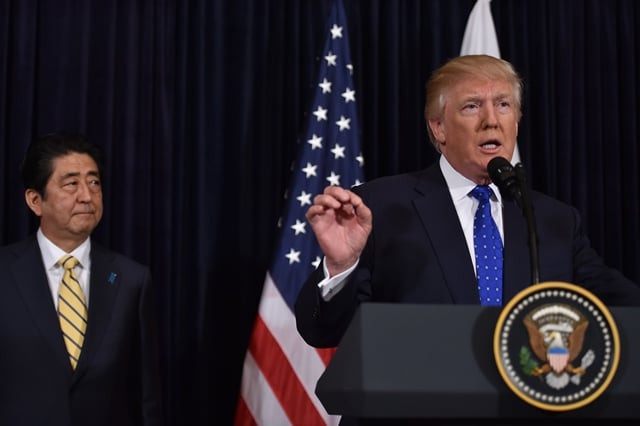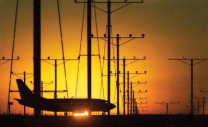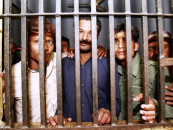North Korea fires ballistic missile, drawing tough response from Trump
The Musudan has a range of 2,500-4,000 km, meaning it could threaten both Japan and US bases on Guam

Japanese Prime Minister Shinzo Abe (L) and US President Donald Trump speak at Trump's Mar-a-Lago resort in Palm Beach, Florida, on February 11, 2017, after North Korea reportedly fired a ballistic missile, the first since Donald Trump became US president. PHOTO: AFP
Japanese Prime Minister Shinzo Abe, whose country would be in range of any hostile North Korean launch, called the test "absolutely intolerable" during an impromptu press conference with Trump in Florida.
South Korea's Joint Chiefs of Staff, altering an earlier military assessment, said the test was "highly likely" to have been of a modified intermediate-range Musudan missile.
The Musudan has a range of 2,500-4,000 km, meaning it could threaten both Japan and US bases on Guam.
The missile was launched around 7:55 am (2255 GMT Saturday) from Banghyon air base in the western province of North Pyongan, and flew east towards the Sea of Japan (East Sea), the South's defence ministry said.
It flew about 500 kilometres (310 miles) before falling into the sea, a ministry spokesman said.
"Today's missile launch... is aimed at drawing global attention to the North by boasting its nuclear and missile capabilities", the ministry said in a statement.
Trump: Washington '100%' behind Tokyo after North Korea missile launch
"It is also believed that it was an armed provocation to test the response from the new US administration under President Trump," it added.
It was the first such test since last October.
Trump, speaking alongside Abe, said Washington was committed to his country's security.
"I just want everybody to understand and fully know that the United States of America stands behind Japan, its great ally, 100 percent," he said, without elaborating.
Japan's top government spokesman Yoshihide Suge said in Tokyo the test was "clearly a provocation to Japan and the region".
North Korea is barred under UN resolutions from any use of ballistic missile technology. But six sets of UN sanctions since Pyongyang's first nuclear test in 2006 have failed to halt its drive for what it insists are defensive weapons.
Last year the country conducted two nuclear tests and numerous missile launches in its quest to develop a nuclear weapons system capable of hitting the US mainland.
North Korea missile test draws ire of US, Japan, South Korea
Seoul-based academic Yang Moo-Jin said the latest test was "a celebratory launch" to mark the February 16 birthday of Kim Jong-Il, late ruler and father of current leader Kim Jong-Un.
Pyongyang often celebrates key anniversaries involving current and former leaders with missile launches, Yang, a professor at the University of North Korean Studies, told AFP.
South Korea's acting president Hwang Gyo-Ahn vowed a "corresponding punishment" in response to the launch, which came on the heels of a visit to Seoul by US Defense Secretary James Mattis this month.
Mattis had warned Pyongyang that any nuclear attack would be met with an "effective and overwhelming" response.
Trump's national security adviser Michael Flynn spoke to his South Korean counterpart Kim Kwan-Jin by phone and agreed to "seek all possible options" to curb future provocations by the North, Seoul's presidential office said.
Japan's Abe heads for Trump summit with jobs package
Australian Prime Minister Malcolm Turnbull also condemned the launch as a "further threat to regional... peace and stability" and vowed to work with Beijing, Seoul and Tokyo to heap pressure on Pyongyang.
The European Union noted that the test violated multiple UN Security Council resolutions.
"The DPRK's (North Korea's) repeated disregard of its international obligations is provocative and unacceptable," it said in a statement. France separately joined in the condemnation.
In January leader Kim Jong-Un boasted that Pyongyang was in the "final stages" of developing an intercontinental ballistic missile (ICBM) in an apparent attempt to pressure the incoming US president. Trump shot back on Twitter, saying "It won't happen."



















COMMENTS
Comments are moderated and generally will be posted if they are on-topic and not abusive.
For more information, please see our Comments FAQ